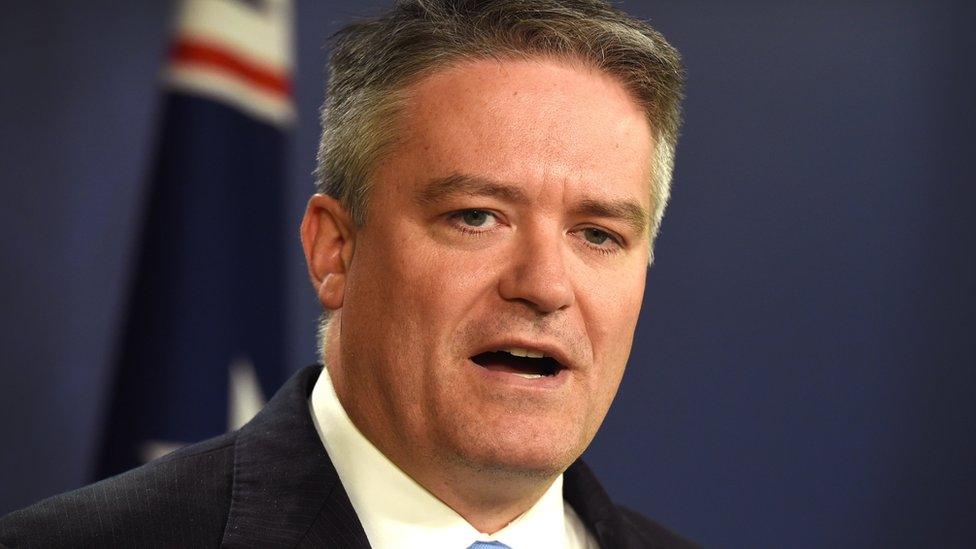Mathias Cormann set to head OECD despite climate record
- Published

Critics say Mr Cormann has an "atrocious" record on climate change
Mathias Cormann, Australia's longtime former finance minister, is set to take over as chief of the Organisation for Economic Co-operation and Development.
Mr Cormann, a centre-right politician, had faced opposition stemming from his record on climate change.
He tried to abolish Australia's renewable energy targets and has called carbon pricing a "very expensive hoax".
Sweden's Cecilia Malmström was also vying to lead the group, which includes 37 of the world's biggest economies.
The Paris-based OECD, which helps develop and coordinate policies among its members, is expected to finalise Mr Cormann's selection next week. He would serve a five-year term starting in June.
Greenpeace International, which helped spearhead outside opposition to Mr Cormann's candidacy, called his selection a "missed opportunity" for the group, which includes the US, UK, Germany and Japan among others.
"We have little confidence in Mr Cormann's ability to ensure the OECD is a leader in tackling the climate crisis when he himself has an atrocious record on the issue, including opposition to carbon pricing," executive director Jennifer Morgan said.
"This was a missed opportunity for the OECD member states to draw a line in the sand and disqualify anyone with a history of blocking climate action from senior international appointments."
Mr Cormann has responded to the criticism, saying he was "absolutely committed to ambitious and effective action on climate change", but that there were different ways to achieve it.
Who is Mathias Cormann?
As the next leader of the Paris-based OECD, Mr Cormann is facing an agenda that includes tackling the economic impact of the coronavirus pandemic, addressing climate change and reaching a global deal on how to tax technology companies.
A native German speaker who was born in Belgium, Mr Cormann moved to Australia in his mid-20s, working in health insurance and politics.
He holds the record as the country's longest-serving finance minister, serving from 2013 to 2020. He also represented western Australia as a Liberal Party senator from 2007 to 2020.
Known to favour lower taxes, he pledged during his campaign for the OECD job to deploy "every policy and analytical capability available through the OECD to help economies around the world achieve global net-zero emissions by 2050".
The group should help identify "market-based ... solutions which maximise reduction outcomes in a way that preserves energy affordability and is economically responsible" he added.
Australia Prime Minister Scott Morrison claimed the selection as a win for his country, calling it "the most senior appointment of an Australian candidate to an international body for decades," in a statement to the Sydney Morning Herald.
Why was he selected?
OECD insiders said that the breadth of Mr Cormann's political experience and personality played a role in his selection as did his detailed knowledge of the issues in hand. Backing from the US was also reportedly key.
Insiders also told the BBC that having an Australian in charge would provide good geopolitical balance for an organisation based in the heart of Europe. The most recent country to join was Colombia, and Costa Rica is in the process of doing so.
However, there has also been criticism over the lack of transparency in the selection process, which was led by the UK.
One observer described it as "cloak and daggers" and questioned whether that was appropriate for an organisation whose members are democracies.
Former EU trade commissioner Cecilia Malmström was the other finalist of the 10 candidates who entered the contest to succeed Mexico's Angel Gurria, who has led the group for 15 years.
The possible selection of Mr Cormann prompted debate in the UK, which is set to host an important climate change summit in Glasgow later this year.
In December Labour's Shadow International Trade Secretary Emily Thornberry wrote to Boris Johnson saying that supporting Mr Cormann "would make a mockery of your own claims to leadership on climate change and would send entirely the wrong signal to the world about how seriously the UK takes the issue".
- Published9 March 2021

- Published10 June 2020
